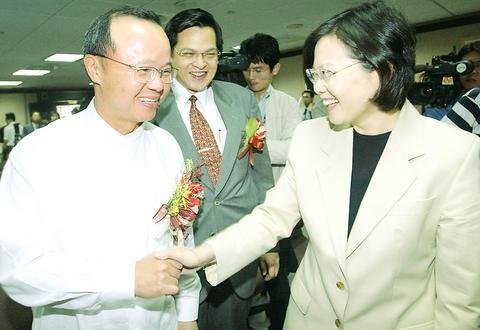President Chen Shui-bian (陳水扁) will give details of the constitutional reform agenda slated for 2006 in his inauguration speech tomorrow, Mainland Affairs Council chairman-designate Joseph Wu (吳釗燮) said yesterday.
Wu, currently deputy secretary-general of the Presidential Office, said during a news conference for foreign reporters covering the inauguration that reforming the government structure and the legislature will be key issues the new constitution aims to deal with.
The strong worded statement on Taiwan which Beijing issued on Monday, condemning Chen's alleged separatists actions such as referendums and calling for a new constitution, shows that China does not understand Taiwan's democratization process, Wu said.

PHOTO: CNA
According to Wu, the current five-branch system of government has not functioned efficiently and needs to be changed.
When asked whether Chen will repeat his "five noes" pledge in tomorrow's speech, Wu said Chen's inaugural address will follow the spirit of the one he made four years ago
Voicing concern about the escalation of China's military power, Wu said Taiwan needs to strengthen its own military capacity by procuring more weapons and cooperating with the US.
China has been developing and modernizing its air and naval forces and purchasing arms from Russia, Wu said, noting in China and Taiwan's case, "the stronger side may be tempted to use military force against the weaker side."
He said while misunderstandings between Beijing and Taipei exist, some of his academic friends in China, who advise the Chinese leadership about Taiwan, have been frustrated because they frequently discover that their reports have been revised by government officials reviewing the documents.
By the time the reports reach the top officials, they're unrecognizable from the original, he said.
Wu said Taiwan's independence is not an issue for the people of Taiwan, who elect their own president and legislature.
Every aspect of Taiwan will prove it an "exclusive jurisdiction," he said.
Meanwhile, outgoing council chairperson Tsai Ing-wen (
The council held yesterday a farewell tea party for its three outgoing officials, Tsai and vice chairmen Chen Ming-tong (

‘DENIAL DEFENSE’: The US would increase its military presence with uncrewed ships, and submarines, while boosting defense in the Indo-Pacific, a Pete Hegseth memo said The US is reorienting its military strategy to focus primarily on deterring a potential Chinese invasion of Taiwan, a memo signed by US Secretary of Defense Pete Hegseth showed. The memo also called on Taiwan to increase its defense spending. The document, known as the “Interim National Defense Strategic Guidance,” was distributed this month and detailed the national defense plans of US President Donald Trump’s administration, an article in the Washington Post said on Saturday. It outlines how the US can prepare for a potential war with China and defend itself from threats in the “near abroad,” including Greenland and the Panama

A wild live dugong was found in Taiwan for the first time in 88 years, after it was accidentally caught by a fisher’s net on Tuesday in Yilan County’s Fenniaolin (粉鳥林). This is the first sighting of the species in Taiwan since 1937, having already been considered “extinct” in the country and considered as “vulnerable” by the International Union for Conservation of Nature. A fisher surnamed Chen (陳) went to Fenniaolin to collect the fish in his netting, but instead caught a 3m long, 500kg dugong. The fisher released the animal back into the wild, not realizing it was an endangered species at

The High Prosecutors’ Office yesterday withdrew an appeal against the acquittal of a former bank manager 22 years after his death, marking Taiwan’s first instance of prosecutors rendering posthumous justice to a wrongfully convicted defendant. Chu Ching-en (諸慶恩) — formerly a manager at the Taipei branch of BNP Paribas — was in 1999 accused by Weng Mao-chung (翁茂鍾), then-president of Chia Her Industrial Co, of forging a request for a fixed deposit of US$10 million by I-Hwa Industrial Co, a subsidiary of Chia Her, which was used as collateral. Chu was ruled not guilty in the first trial, but was found guilty

DEADLOCK: As the commission is unable to forum a quorum to review license renewal applications, the channel operators are not at fault and can air past their license date The National Communications Commission (NCC) yesterday said that the Public Television Service (PTS) and 36 other television and radio broadcasters could continue airing, despite the commission’s inability to meet a quorum to review their license renewal applications. The licenses of PTS and the other channels are set to expire between this month and June. The National Communications Commission Organization Act (國家通訊傳播委員會組織法) stipulates that the commission must meet the mandated quorum of four to hold a valid meeting. The seven-member commission currently has only three commissioners. “We have informed the channel operators of the progress we have made in reviewing their license renewal applications, and